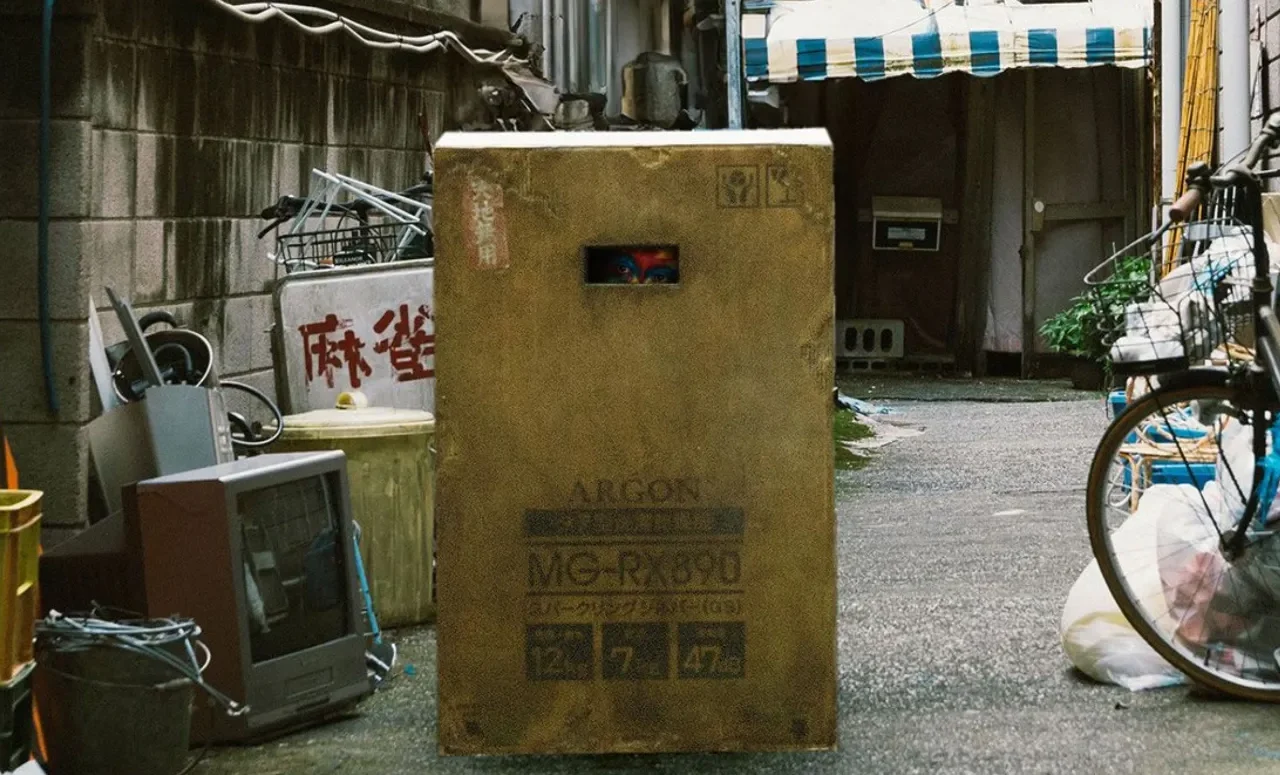The Box Man

The Box Man commences with a few establishing shots on one of the Tokyo streets. It’s just another ordinary day in the Japanese capital, and people seem to calmly amble without any particular cause for concern. Yet, here, somewhere in the middle of one of the medium shots, we can spot a peculiarly looking box. It just stands there, somewhat helplessly, somehow tranquilly waiting for its personal Godot.
Suddenly, the camera abruptly zooms in and now the medium shot transits to a close-up of the same box. Apparently, it has a tiny hole, which reveals two pensive eyes that observe Tokyo’s pedestrians. In fact, the gaze spots their legs, as the box’s size compels the man to crouch. And, this enigmatic individual is also aware that someone constantly follows him, fully cognisant of his presence.
Simultaneously, we hear the person’s non-diegetic voice (in the role of the film’s narrator). It’s a stentorian male voice, which suggests that he is proud of finding himself in those bizarre circumstances. The figure explains that he calls himself “The Box Man” and, in his monologue, encapsulates the narrative’s transcendental themes (later echoed in the film) while explaining that there is a powerful man who would like to steal this so-called box “privilege”.
The rest is a veiled mystery, full of unexpected twists, avant-garde themes, various genres (romance, detective thriller, philosophical drama) and a few deviant motives. “Take it or leave it,” the film tries to tell us during its introduction. As banal as it might sound, this excess is not for everyone.
Gakuryū Ishii’s film, a lifetime project on which he has been working for almost 27 years, is based on the eponymous and popular novel, written by Kōbō Abe in 1973. Most crucially, its plot’s substance won’t be understandable for a viewer who hasn’t read the novel. It’s a film where Franz Kafka meets some modernist affairs, so comprehending what ensues is more than a challenge. But, it’s like a jigsaw puzzle, which can also be a source of tremendous contentment.
Consequently, the box becomes a metaphor for toxic masculinity, wearing masks and the act of pretence. The movie’s men will do everything (even try to kill each other) only to become the only “Box Man” in the entirety of Tokyo. Ishii’s experiment implies that the box is an illusory device, which badly affects our lives. It only depends on us if we will embrace ourselves or will still stay in the same old box, which has always concealed the broader picture of the external world: it’s really all up to us. The eeriest film of the festival so far, you won’t have seen anything like this.
Jan Tracz
The Box Man does not have a UK release date yet.
Read more reviews from our Berlin Film Festival 2024 coverage here.
For further information about the event visit the Berlin Film Festival website here.
Watch a clip from The Box Man here:


























Facebook
Twitter
Instagram
YouTube
RSS